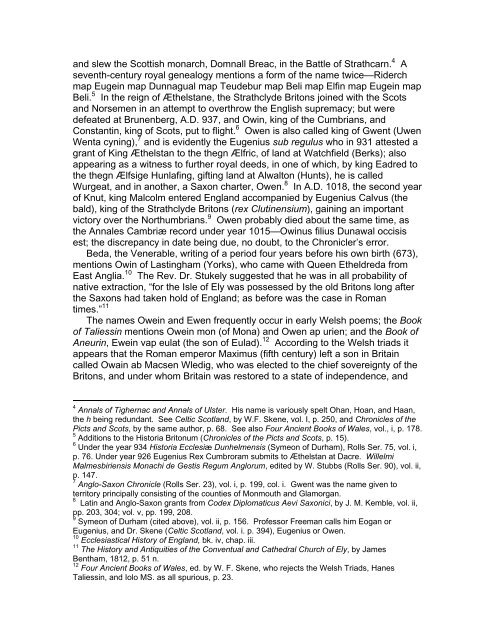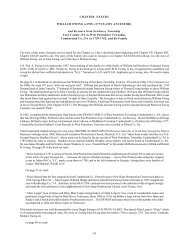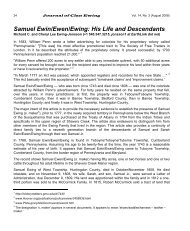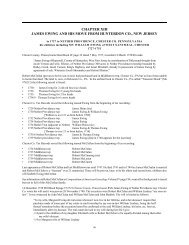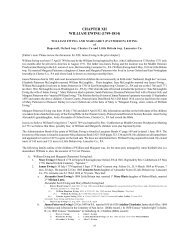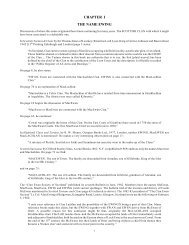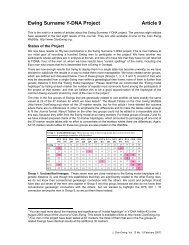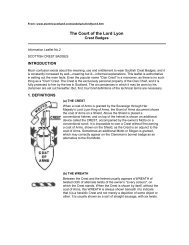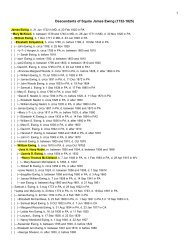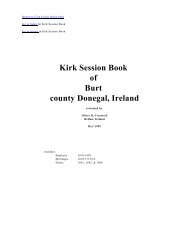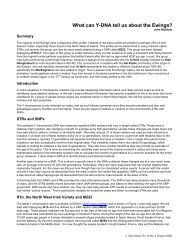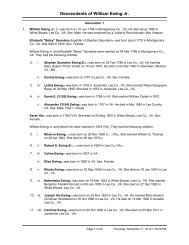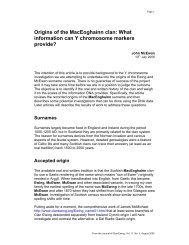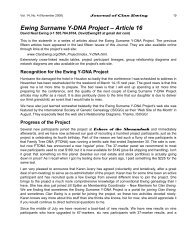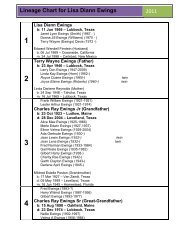Chapter XIV - Ewing Family Association
Chapter XIV - Ewing Family Association
Chapter XIV - Ewing Family Association
You also want an ePaper? Increase the reach of your titles
YUMPU automatically turns print PDFs into web optimized ePapers that Google loves.
and slew the Scottish monarch, Domnall Breac, in the Battle of Strathcarn. 4 A<br />
seventh-century royal genealogy mentions a form of the name twice—Riderch<br />
map Eugein map Dunnagual map Teudebur map Beli map Elfin map Eugein map<br />
Beli. 5 In the reign of Æthelstane, the Strathclyde Britons joined with the Scots<br />
and Norsemen in an attempt to overthrow the English supremacy; but were<br />
defeated at Brunenberg, A.D. 937, and Owin, king of the Cumbrians, and<br />
Constantin, king of Scots, put to flight. 6 Owen is also called king of Gwent (Uwen<br />
Wenta cyning), 7 and is evidently the Eugenius sub regulus who in 931 attested a<br />
grant of King Æthelstan to the thegn Ælfric, of land at Watchfield (Berks); also<br />
appearing as a witness to further royal deeds, in one of which, by king Eadred to<br />
the thegn Ælfsige Hunlafing, gifting land at Alwalton (Hunts), he is called<br />
Wurgeat, and in another, a Saxon charter, Owen. 8 In A.D. 1018, the second year<br />
of Knut, king Malcolm entered England accompanied by Eugenius Calvus (the<br />
bald), king of the Strathclyde Britons (rex Clutinensium), gaining an important<br />
victory over the Northumbrians. 9 Owen probably died about the same time, as<br />
the Annales Cambriæ record under year 1015—Owinus filius Dunawal occisis<br />
est; the discrepancy in date being due, no doubt, to the Chronicler’s error.<br />
Beda, the Venerable, writing of a period four years before his own birth (673),<br />
mentions Owin of Lastingham (Yorks), who came with Queen Etheldreda from<br />
East Anglia. 10 The Rev. Dr. Stukely suggested that he was in all probability of<br />
native extraction, “for the Isle of Ely was possessed by the old Britons long after<br />
the Saxons had taken hold of England; as before was the case in Roman<br />
times.” 11<br />
The names Owein and Ewen frequently occur in early Welsh poems; the Book<br />
of Taliessin mentions Owein mon (of Mona) and Owen ap urien; and the Book of<br />
Aneurin, Ewein vap eulat (the son of Eulad). 12 According to the Welsh triads it<br />
appears that the Roman emperor Maximus (fifth century) left a son in Britain<br />
called Owain ab Macsen Wledig, who was elected to the chief sovereignty of the<br />
Britons, and under whom Britain was restored to a state of independence, and<br />
4 Annals of Tighernac and Annals of Ulster. His name is variously spelt Ohan, Hoan, and Haan,<br />
the h being redundant. See Celtic Scotland, by W.F. Skene, vol. I, p. 250, and Chronicles of the<br />
Picts and Scots, by the same author, p. 68. See also Four Ancient Books of Wales, vol., i, p. 178.<br />
5 Additions to the Historia Britonum (Chronicles of the Picts and Scots, p. 15).<br />
6 Under the year 934 Historia Ecclesiæ Dunhelmensis (Symeon of Durham), Rolls Ser. 75, vol. i,<br />
p. 76. Under year 926 Eugenius Rex Cumbroram submits to Æthelstan at Dacre. Willelmi<br />
Malmesbiriensis Monachi de Gestis Regum Anglorum, edited by W. Stubbs (Rolls Ser. 90), vol. ii,<br />
p. 147.<br />
7 Anglo-Saxon Chronicle (Rolls Ser. 23), vol. i, p. 199, col. i. Gwent was the name given to<br />
territory principally consisting of the counties of Monmouth and Glamorgan.<br />
8 Latin and Anglo-Saxon grants from Codex Diplomaticus Aevi Saxonici, by J. M. Kemble, vol. ii,<br />
pp. 203, 304; vol. v, pp. 199, 208.<br />
9 Symeon of Durham (cited above), vol. ii, p. 156. Professor Freeman calls him Eogan or<br />
Eugenius, and Dr. Skene (Celtic Scotland, vol. i. p. 394), Eugenius or Owen.<br />
10 Ecclesiastical History of England, bk. iv, chap. iii.<br />
11 The History and Antiquities of the Conventual and Cathedral Church of Ely, by James<br />
Bentham, 1812, p. 51 n.<br />
12 Four Ancient Books of Wales, ed. by W. F. Skene, who rejects the Welsh Triads, Hanes<br />
Taliessin, and Iolo MS. as all spurious, p. 23.


